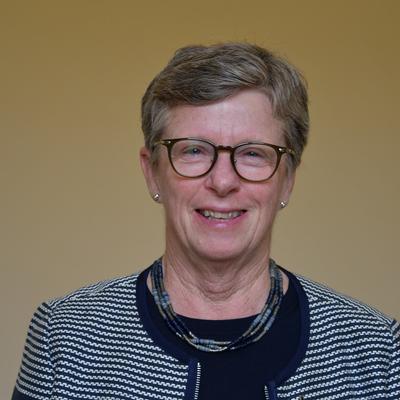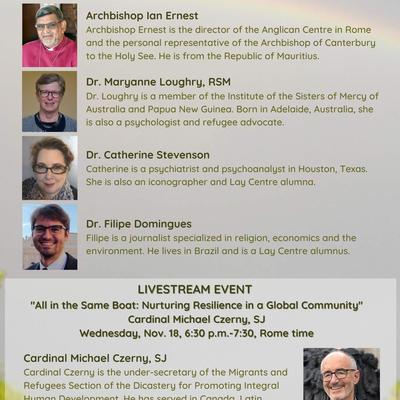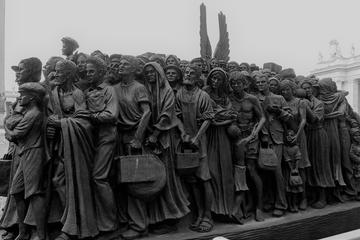
By Dr. Maryanne Loughry, RSM
Resilience is the capacity of a system to withstand or recover from significant disturbance that threatens its adaptive function, viability or development (Masten, 2015);
The good news is that resilience is common and can be promoted when humans are supported in friendship, family, and community;
Most importantly for us, scholars have found that faith-based organizations can play a special role in promoting and strengthening resilience.
Times of crisis are not unfamiliar to the Catholic Church. Times of crisis are also very familiar to those we care for. Our love and preference for the poor and suffering have impelled us to encounter individuals and communities that have stretched and shaped us, our communities of faith, and our congregations. This present crisis — the COVID-19 pandemic — is unprecedented for some of us, yet it has familiar characteristics for those who know suffering: uncertainty, fear, loss, grief, and pain. What has previously given comfort — family, neighbours, embraces and rituals — has been stripped away and we do not know if or when it will return.
Arguably, we have been formed for these times and we are part of an institution, the Catholic Church, that has at its centre a commitment to respond to those in need, to those in crisis. One of our challenges today is to know how best to focus this commitment because in this crisis we, too, are impacted; we, too, are experiencing the cascading loss and grief characteristic of this pandemic.
The language of resilience and adversity is not in our Scriptures or constitutions. In these sacred documents, we are called to be kind, merciful, charitable, and benevolent. We have come to know poverty and pain, loss and grief through our own lives and the lives of those to whom we minister. Today’s science calls these human experiences adversity. I believe that a deeper understanding of the concept of adversity — and its partner concept resilience — can strengthen our Church’s response to COVID-19.
In 2014, psychologist Ann Masten wrote a seminal book on childhood resilience called “Ordinary Magic”. This book, and her subsequent work, challenged earlier concepts of disadvantage and adversity in childhood as being determinants for deficits in adulthood; of crises impairing humans for life. When exploring adversity, Masten, with other scholars, researched settings where children experienced separation, poverty, the death of parents, violence, alcoholism, and later on conflict — settings that challenged the children’s and families’ capacity to thrive. She found that many children from such settings not only survived these adverse experiences, but went on to live fruitful lives as resilient adults. She concluded that resilience was much more about “ordinary” rather than extraordinary processes, and was much more common in people than previously thought.
Scholars describe resilience as the capacity humans have to rebound from adversity, to bounce back from crises. They have found that strategies, such as reducing exposure to risk and increasing available resources, can and will strengthen humans’ adaptive systems.
Close friends, cohesive families and neighbourhoods, positive parenting, strong schools, supportive sports groups, and faith-based organizations have been identified as key resources that play a significant role in restoring a person’s adaptive systems during and after a crisis. The more resourceful the multiple systems that humans interact with, the more resilient the individuals they serve.
The faith-based organizations identified in these studies are our parishes, dioceses, and religious congregations. The encyclical of Pope Francis “Laudato Sì'” tells us that today the Catholic Church is not indifferent to anything in this world. We are not indifferent to COVID-19 as a crisis for all of humanity; the same encyclical reminds us that human life is itself a gift that must be defended. Practically, then, COVID-19 calls forth our Church’s response because we have come to know that everything is interconnected. Science and our experience tell us that we, as individuals and as Church, have a vital role to play in promoting resilience.
What is this role? Masten and other scholars who work on resilience and adversity provide us with a framework for a response to this crisis and to crises to come. Their work assures us that, in spite of the present crisis, humans will rebound; that the multiple systems we are part of must promote and strengthen the psychosocial factors that in turn will promote resilience; and that, in particular, our expressions of faith — tradition, celebration, and a sense of community — play an essential role.
The stronger and more responsive our Church, ministries, and religious congregations are for each of us and our world, the stronger we and our communities will be for the challenge of promoting resilience throughout these times. Our self-care, formation programs, community and parish life, and congregational and diocesan policies and practice are there to enable and assist us to be the resource our world needs in global solidarity.
Suggested reading:
Ann Masten (2014). Ordinary Magic: Resilience in Development. NY, Guilford Press.
Joey Ager, Elena Fiddian-Qasmiyeh & Alastair Ager (2015). Local Faith Communities and the Promotion of Resilience in Contexts of Humanitarian Crisis. Journal of Refugee Studies, 28,2, 202-221.
Pope Francis (2015). Laudato Si': On Care for our Common Home, Città del Vaticano, Libreria Editrice Vaticana, pg 2.
Dr. Maryanne Loughry, RSM is a member of the Institute of the Sisters of Mercy of Australia and Papua New Guinea (ISMAPNG) and a psychologist. She is presently a research professor at the School of Social Work, Boston College, USA and a research associate of the Refugee Studies Centre, University of Oxford, UK. Dr. Loughry has worked in refugee work with the Jesuit Refugee Service (JRS) commencing in refugee camps in South East Asia in 1988.
Dr. Loughry has served (1996-2003) as a member of the Pedro Arrupe Tutor at Campion Hall, University of Oxford (MCASD) and is a member of the Governing Committee of the International Catholic Migration Commission (ICMC), Geneva. In 2010 she was awarded the Order of Australia (AM) for service to displaced persons.




